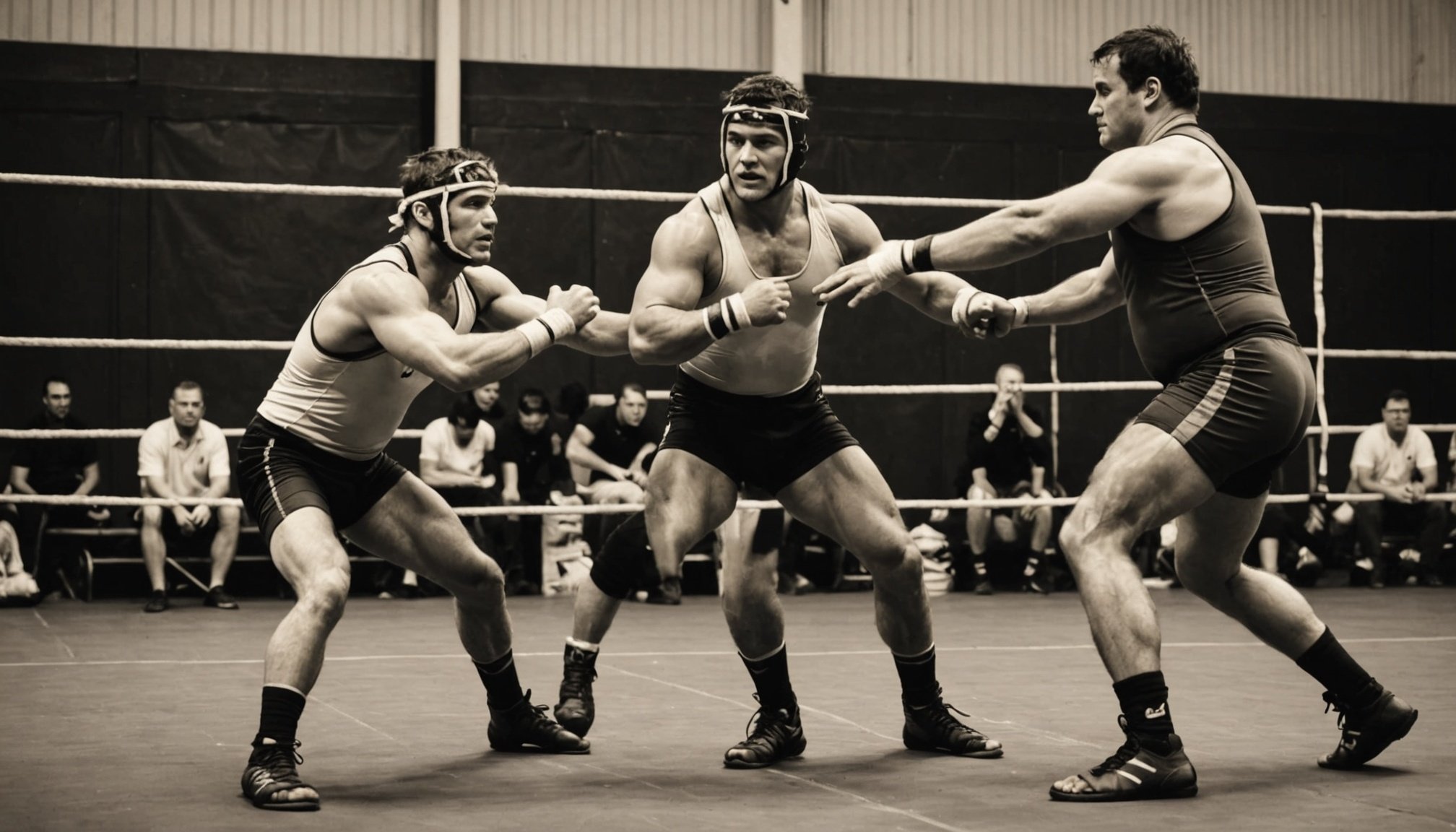Overview of Traditional UK Wrestling
Traditional UK wrestling possesses a rich history, deeply entwined with the nation’s cultural fabric. Emerging centuries ago, its origins can be traced back to local fairs and community gatherings, where contests were held as a form of entertainment and social bonding. This early form of wrestling was not just a sport but a reflection of the community’s cultural heritage, showcasing strength and skill.
As time progressed, the cultural significance of traditional UK wrestling expanded. Within local communities, wrestling became a symbol of pride and identity. It was not uncommon for annual events to draw crowds who eagerly supported their local athletes. This sense of community and cross-generational participation fortified wrestling as a cherished regional tradition.
This might interest you : Ultimate Guide to Mental and Physical Prep for Competing in UK National Judo Championships
Over the years, the evolution of training practices and styles has been marked by innovation. While maintaining core principles, contemporary wrestlers have embraced new techniques and regimes, blending traditional methods with modern advancements. This evolution has allowed the sport to remain relevant and dynamic, appealing to newer generations while preserving its historical essence.
In essence, traditional UK wrestling is more than just a sport. It is a testament to the resilience and adaptability of cultural heritage, standing the test of time in the UK.
In the same genre : Mastering Cage Control: Effective Strategies for UK MMA Fighters to Enhance Their Technique
Strategies for Preserving Cultural Heritage During Training
Preserving cultural heritage in training environments requires well-planned and thoughtful preservation strategies. These strategies should not only incorporate historical techniques but also engage communities and support local traditions.
Incorporating Historical Techniques into Training
Integrating historical techniques into training sessions can enhance the cultural value of the practice. Emphasising traditional grappling techniques allows trainees to connect with the roots of cultural practices. Furthermore, storytelling plays a crucial role in teaching these techniques, making them more relatable and memorable. Utilising historical materials, such as artefacts or documentation, enriches the learning experience, offering trainees a tangible connection to the past.
Community Engagement and Participation
Building a strong community around traditional wrestling is essential. Organising events that focus on cultural aspects fosters inclusivity and preservation. Encouraging mentorship from experienced wrestlers provides valuable insights and guidance, while collaborative training sessions with a cultural focus allow for shared learning experiences. These activities not only support the training techniques but also strengthen community bonds.
Supporting Local Traditions and Customs
Incorporating local traditions into training routines highlights the unique aspects of a community’s heritage. Engaging with local festivals and events allows wrestlers to participate and promote the sport. Developing community-based competitions further supports local customs, creating opportunities for preservation strategies to thrive.
Practical Tips for Traditional Wrestlers
Training as a traditional wrestler involves adhering to specific cultural practices while also adapting to modern demands. Maintaining authenticity in training environments is essential. Wrestlers should aim to practice in spaces that respect traditional protocols and rituals. This helps preserve cultural integrity while keeping the essence of the sport alive.
Balancing modern techniques with ancient methodologies is another crucial aspect. Traditional wrestlers might incorporate contemporary conditioning routines without straying from their roots. Using modern equipment to enhance strength and flexibility can improve performance, all while staying true to traditional forms.
For ongoing education and training, accessing resources that blend both historical and current wrestling insights is recommended. Consider these:
- Workshops that focus on the fusion of old techniques with new innovations
- Books and documentaries about wrestling legends and their unique training regimens
- Online platforms offering a mix of traditional moves and modern adaptations
These resources can provide valuable practical advice for sharpening skills, understanding cultural nuances, and coping with the evolving landscape of wrestling. Embracing both the past and the present offers a holistic approach to mastering the art of traditional wrestling.
Importance of Community Involvement
Community involvement plays a vital role in the sustainability of traditional wrestling. This engagement not only helps in preserving the wrestling styles and traditions but also fosters a strong sense of cultural appreciation among new generations. Cross-generational engagement ensures the continued transmission of these valued practices, allowing younger community members to learn from the experiences of their elders.
In a world where cultural heritage faces challenges, community networks provide essential support for knowledge-sharing. By creating spaces where experienced wrestlers can share their techniques and historical insights, these networks help maintain the vitality of wrestling traditions. Community involvement also strengthens bonds, encouraging respect and appreciation for the diverse backgrounds and experiences that contribute to the wrestling culture.
Tradition sustainability is achieved through dedicated efforts by community members to engage with one another consistently. By celebrating cultural appreciation, communities ensure that traditional wrestling remains relevant and vivid for future generations. This exchange not only preserves historical wrestling practices but also enriches the cultural fabric of the community, offering both participants and spectators a deeper understanding of their shared history and traditions.
Importance of Preserving Traditional Wrestling Techniques
Traditional wrestling is a cornerstone of cultural heritage, providing more than just athletic benefits – it shapes the identity of wrestlers in profound ways. Delving into historical wrestling techniques is crucial because they serve as a foundation for modern practices. Wrestling methods of the past have evolved into the diverse styles seen today, but preserving these roots is vital to maintain the authenticity and depth of the sport.
Cultural heritage plays a pivotal role in moulding contemporary wrestling, merging ancient rituals with innovative strategies. By understanding and embracing these historical techniques, wrestlers can enrich their craft, adding layers of depth to their training routines. The fusion of traditional and modern elements fosters a more holistic and informed approach, enabling wrestlers to gain a competitive edge.
The identity of wrestlers is significantly bolstered by an appreciation of traditional techniques. It provides not only a tactical advantage but also a sense of belonging and continuity within a rich cultural tapestry. By honouring these practices, wrestlers are better equipped to represent their heritage and the legacy of the sport more authentically, ensuring that the essence of traditional wrestling is passed down through generations.
Training Methodologies for Traditional Wrestling
Training methodologies for traditional wrestling involve a blend of skill development, historical techniques, and community engagement. These strategies ensure wrestlers not only enhance their abilities but also maintain a connection to their cultural heritage.
Incorporating Historical Techniques
Integrating historical techniques is crucial for wrestlers to connect with their roots. Learning essential historical moves, such as the arm throw or leg sweep, provides insights into the legacy of wrestling. These age-old techniques hold contemporary relevance, offering both practical skill-building and a sense of continuity with the past. Crafting training routines that emphasize these traditional practices supports a deeper appreciation and understanding of wrestling’s rich lineage.
Community Engagement in Training
Local wrestling clubs and communities play an integral role in training strategies. They host events that not only preserve historical techniques but also foster camaraderie among wrestlers. Collaborative training sessions with local experts provide valuable feedback and expose wrestlers to diverse styles and insights. Such engagements ensure that traditional skills are passed down effectively, enriching the training experience.
Educational Resources for Trainers
The availability of workshops and training materials is invaluable for trainers. Documented instructional resources, such as videos and manuals, offer structured guidance in executing historical techniques. Educational initiatives connect trainers with wrestling history, and workshops empower them to integrate learning into their coaching, enhancing overall training strategies and skill development.
Case Studies of Successful Preservation Efforts
Exploring cultural preservation through the lens of UK wrestling clubs reveals a remarkable tapestry of dedication and innovation. These clubs are at the forefront of preserving wrestling techniques that trace back centuries.
UK Wrestling Clubs’ Efforts
Some of Britain’s most cherished wrestling clubs have undertaken initiatives to maintain and celebrate traditional wrestling forms. Case studies abound, highlighting clubs that have curated archives, taught historical techniques, and fostered community. These efforts ensure these cultural techniques resonate with new generations, encouraging an appreciation for successful practices.
Voices of Experience
Interviews with trainers and wrestlers paint a vivid picture of this dedication. Trainers discuss their mission to keep tradition alive, often blending classical techniques with modern methods. Wrestlers share personal anecdotes about how embracing tradition has enriched their practice, showcasing the transformative power of culturally-informed training.
Cultural Events
UK clubs routinely participate in local cultural events to highlight traditional wrestling. These events not only celebrate the sport but serve as educational platforms. Audiences experience firsthand the unique blend of tradition and innovation that defines these clubs, making them valuable ambassadors of cultural heritage.
Together, these elements demonstrate the power and practicality of preserving wrestling techniques within UK clubs.
Integrating Cultural Values into Training
The successful integration of cultural values into training significantly impacts the wrestling community. For many, wrestling is not just a sport but a reflection of their cultural heritage. Incorporating these values into training can foster a deeper connection and understanding among participants.
Developing a Training Framework
Creating a cohesive framework requires setting clear goals that align with cultural values. Trainers should establish guidelines that incorporate cultural heritage, ensuring these are respected and celebrated during the training process. This involves recognising traditional practices and infusing them within modern training methods. Trainers can create a unique environment that marries tradition with innovative techniques, promoting both progress and respect for heritage.
Importance of Mentorship in Wrestling
Mentorship plays a pivotal role in wrestling, acting as a bridge between generations. Experienced wrestlers can pass down invaluable knowledge and skills, fostering a robust mentorship culture benefits youth by offering insights into the sport’s nuances. Mentorship programmes enhance the developmental process by guiding young wrestlers in their journey, equipping them to carry traditions forward.
Events that Celebrate Traditional Wrestling
Events that celebrate traditional wrestling offer vital opportunities to showcase cultural heritage. Competitions and festivals are platforms where wrestlers and audiences can engage with traditional practices, raising cultural awareness. These are chances not only to compete but to demonstrate the enduring legacy of wrestling, ensuring its traditions remain vibrant and relevant.











